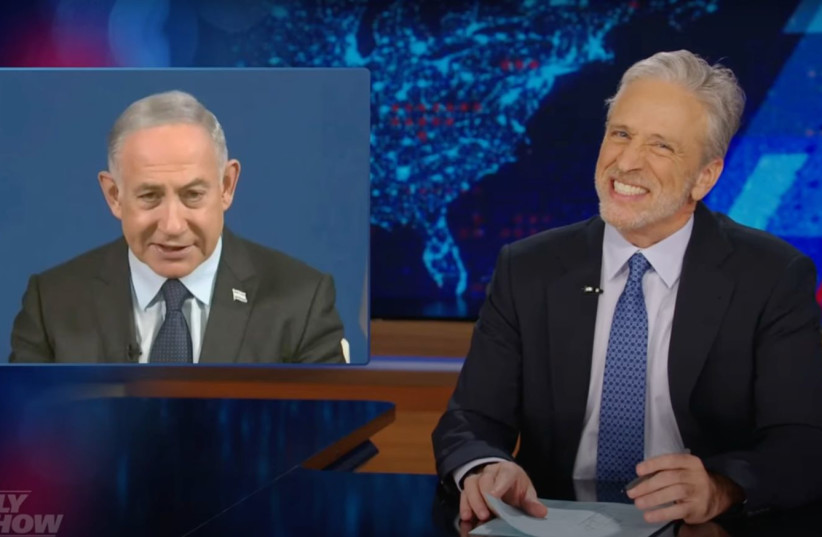Jon Stewart, the American comedian who has recently returned for a temporary stint as host of Comedy Central’s The Daily Show, focused his Monday show on the war between Israel and Gaza.
In a 13-minute monologue, the comedian painted both the government of Prime Minister Benjamin Netanyahu and the Hamas government of Gaza as participants in a cycle of violence that, he suggested, has no “military solution.”
Stewart did not address the conflict with Hezbollah in Israel's north, or actions by other Middle Eastern actors, such as the Houthis, since the outbreak of war on October 7.
The monologue was followed by a joint interview with The Intercept’s Murtaza Hussein and The Atlantic’s Yair Rosenberg.
It was Stewart’s third weekly episode since returning, for election season, to the role he made famous. The first episode, just two weeks ago, focused on the age issue in the 2024 election, President Biden and his likely opponent, former President Donald Trump. The two are the oldest men ever to hold the office. The second episode, last week, was mostly dedicated to Tucker Carlson’s interview of Vladimir Putin in Moscow.
During the first episode, Stewart did make one comment about the war in Gaza, accusing President Biden of understating what the host called "Israel's incessant bombing of civilians."

Stewart characterizes Netanyahu's day-after plan as a "military siege"
After several jokes about the heated nature of discourse about the conflict, Stewart played a clip from CNN in which an anchor summarized Netanyahu’s “day after” plan, reporting that the Prime Minister “is calling for complete demilitarization of Gaza as well as Israel taking over security and controlling entry and exit points to Gaza.”
“So your peace plan,” Stewart said sarcastically, “is a siege. A military siege. You really think a military solution ends this cycle?”
A ‘siege’ is a military blockade with the intent of conquering an area or forcing its inhabitants to surrender, along the lines of Israel’s brief blockade of utilities into Gaza in the first few days following the October 7 attack; Netanyahu did not suggest any restrictions on aid or the flow of goods and services to Gaza, but rather seemed to suggest a similar arrangement to the security controls exercised by Israel since Hamas was elected as the government in Gaza in 2006.
Stewart suggested that Netanyahu’s “plan to eliminate Hamas by destroying all of Gaza” would “make more Hamases,” because “Palestinian liberation is an idea,” comparing Netanyahu’s assertion that “the intense phase of the fighting [in Gaza] is weeks away from completion” to President George W. Bush’s infamous 2003 speech six weeks after the US-led invasion of Iraq, proclaiming the end of major combat operations there.
“If you think that ends Hamas,” Stewart said, “I believe we in the United States have a banner you might use.. It’s a little wind-damaged, but equally delusional.”
US arming, chastening Israel is like a drug dealer counseling his customer, Stewart says
Stewart then charged the United States with enabling “war crimes” in Gaza, contrasting the Biden administration’s muted criticism of Israel to its fierce condemnation of Russian war crimes in Ukraine.
“‘Hey Israel,’” Stewart said, representing the US government, “‘could you please be more careful with your bombing?’ It’s good advice. But really, couldn’t the United States have told Israel that when we gave them all the bombs?
“This is like your coke dealer coming in with a [large amount of cocaine] and going, ‘don’t stay up all night.’”
Then, the comedian turned his ire to the international community, playing a compilation of reports on failed UN resolutions calling for a ceasefire or condemning Hamas.
“Why do you even have a [expletive] building?” Stewart shouted. “We could use that, we have a housing crisis.”
Stewart calls for ceasefire, hostage release, “without preconditions”
Then, Stewart proposed his own solution to the conflict— after presenting two joke suggestions, first an impossibly scaled up version of the Israeli/Palestinian ‘Seeds for Peace’ summer camp in Maine, and then to simply “ask God,” the comedian got serious for a moment:
“Here’s another one,” he said, “and Heaven forbid, I actually think this last one might work: starting now, no preconditions, no ‘earned trust,’ no ‘partners for peace’: Israel stops bombing, Hamas releases the hostages, the Arab countries who claim Palestine as their top priority come in and form a demilitarized zone between Israel and a free Palestinian state… a NATO [type] arrangement guaranteeing security for both sides.”
Several proposals have reportedly been workshopped for a multinational coalition to manage security in Gaza. In November, Israel ceased military action in Gaza for a week, and released hundreds of Palestinian security prisoners, in exchange for the release of women and children hostages. That temporary ceasefire ended when Hamas fired a barrage of rockets into Israel’s south.
Stewart talks to Yair Rosenberg, Murtaza Hussein about the conflict
Following his monologue, Stewart invited two journalists— Murtaza Hussein, a Muslim-American reporter who covers foreign policy and national security for the progressive news site The Intercept, and Yair Rosenberg, an American Jewish journalist who writes for The Atlantic. The two men have been friends for about a decade, they said, regularly discussing issues with each other despite their differing opinions.
Rosenberg, a prominent journalist who covers politics in general as well as religious issues and antisemitism, told Stewart that the conflict is characterized by "absolutists," the influence of whom waxes and wanes relative to that of "pragmatists." Hussein said that he "can accept any Palestinian's view or any Israeli's view when they're so intimately involved in it, but I can never respect a bloodthirsty American," prompting applause from the crowd.
Stewart responded to Hussein that one of the greatest issues he has with American foreign policy is "how cavalier it is about the destruction that so many of our policies have had internationally," citing his experience advocating for veterans who were wounded by army burn pits in Iraq, and his perception of broad apathy about the effects of those burn pits on Iraqis.
